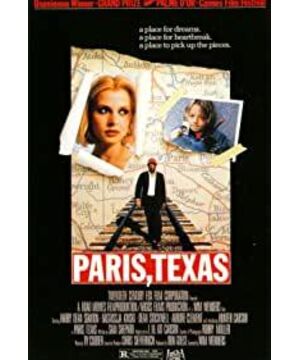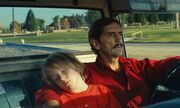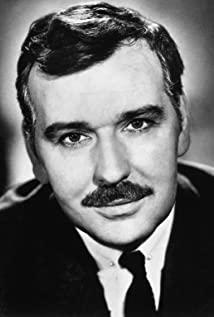However, at the beginning of the film, under the pluck of the guitar, the simple and powerful tone pushes away a scene of loneliness, alienation and helplessness.
The film progresses slowly, and the emotions of the characters are more restrained and restrained, there is no sensational false and funny, everything is so natural.
A knowing smile, or a silent tear, watching a movie at this time has become more of a process of quietly savoring life, rather than what we often do: participating in a noisy, flashy and forgettable event. Put on a show, entertain others, entertain yourself, and then go away.
The picture of the road occupies most of the film, which is Wenders' preference, and also constitutes the theme of the film: At the beginning of the film, Travis is walking on the wilderness, occasionally crossing roads and railway tracks; the once happy scene, It was a family trip; the tacit understanding with his son was restored, on the way from school to home; in search of a wife, and on the road again; and the last choice to leave.
The concrete road and its symbolic state of progress, or "on the road," all suggest the process of life.
Perhaps Travis is an extreme exception: the absence of love makes existence irrelevant, and the exile of self begins: the search for Paris in Texas, where his life began, can give him a sense of meaning at this time, but But it is fragile and fragile: a barren place can not give any comfort to the dazed heart, the only thing that supports him is the constant search and the journey itself; and since then, due to family affection, Travis has embarked on the road of return, which is undoubtedly true. It is the warmest part in the whole film. This comeback is also accompanied by self-salvation, but this redemption is not complete, not subjective reluctance, just some things, whether it is Travis in the play or us off-screen, always. It can't be changed, as Travis said, he found some, but others are gone forever. So Travis finally chose to leave, after he had done what he thought should be done. This time, although helpless, it was more calm than the previous one: before, I had no choice but to flee frantically, but this time I thought about it and went on the road with a smile. With some kind of metaphysical sense of mission.
Travis has a special feeling for walking boots and binoculars, and maybe he's ready for another trip.
It doesn't matter where you go, the purpose doesn't matter, the walking itself is the real meaning.
I stubbornly believe that a good film is always very personal. It does not carry utilitarianism or seek understanding, but only expresses the director's own self. It is in this expression that some details or deep and delicate Emotions can come out clearly and bring about deep resonance;
I am also a stubborn person for real understanding is impossible, this is what we pray to God. More often, we will find that the key to understanding is not whether we can fully appreciate it, but whether we are willing to try to understand, which has a more authentic human connotation.
It's just that I keep trying to understand Travis, or, try to understand.
Then Travis's final departure was unexpected and reasonable.
Unexpectedly, because my personal secular expectations have failed to complete the ending; and reasonable, because of the inevitability of characters, the inevitability of story development, and the inevitability of real life.
From the beginning of his self-exile due to the departure of love, his return due to family affection after the expiration, and the final choice to leave, the main line of seeking the meaning of self-existence runs through.
There are always too many helpless things in the world, and Travis's departure also responded to the theme of the film, or perhaps: the theme of life.
Travis chooses to leave, and Travis's road of return, or his self-salvation road, will continue. However, I am a little worried, in the era without God, how will redemption be completed?
Rather than saying that Wenders reflects the alienation and loneliness of modern people in the film, as he has shown in his other films or some photography and writing works, it is better to say that "Paris, Texas" emphasizes the importance of modern scenes. It also shows an eternal theme, the discussion of family affection and love, and the pursuit of the meaning of existence.
Some commented that Travis's conversation with Jane was the most moving 9-minute love confession in film history, which may be exaggerated, but it is really moving.
There are no sweet words, just descriptive language, but Travis's deep introspection, sincere love, and helplessness with sadness and regret can be seen.
Although we did not have Travis experience, we still felt that what Travis said was what we wanted to say but never said: regardless of joys or sorrows, right or wrong, the words that were not gorgeous sparked the light of our hearts.
Paris, Texas, Paris, Texas, Paris, Texas.
What Travis was trying to find at first might not be the real location in the Gobi with the same name as Paris, but it might be the real Paris. The title of the film blurs the two concepts of Paris intentionally or unintentionally, perhaps to remind us that looking for Paris in Texas is tantamount to looking for utopia in the desert, so the meaning of the destination is dissolved: it becomes a symbol The coordinates above guide us to move forward continuously. Walking becomes the only purpose. The purpose of the film; the purpose of life.
In any case, the scene with Cancion Mixteca is deeply imprinted in my mind, it is the warm color in the film.
I still have Cancion Mixteca echoing in my head,
so I know that yearning for heaven might not be such a bad thing.
View more about Paris, Texas reviews











